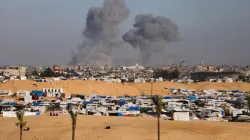US pauses bomb shipment to Israel as Netanyahu signals to ignore West's warning over Rafah attack
The United States has halted a shipment of powerful bombs to Israel, a US official said, as Washington puts pressure on its ally to avoid a full-scale invasion of the Gaza Strip's crowded southern city of Rafah and give more time for ceasefire talks.

The US paused a shipment of bombs to Israel last week over concerns that Israel was approaching a decision on launching a full-scale assault on the southern Gaza city of Rafah against the wishes of the US, a senior administration official said Tuesday.
The shipment was supposed to consist of 1,800 2,000-pound (900-kilogram) bombs and 1,700 500-pound (225-kilogram) bombs, according to the official, who spoke on the condition of anonymity to discuss the sensitive matter, with the focus of US concern being the larger explosives and how they could be used in a dense urban setting. More than 1 million civilians are sheltering in Rafah after evacuating other parts of Gaza amid Israel's war on Hamas, which came after the militant group's deadly attack on Israel on October 7.
Israel has nothing to add to reports that the United States has halted the supply of some munitions, a government spokesperson said on Wednesday. He said he had heard the reports but added "I personally and the Israeli government do not have anything to add to these reports".
US military aid to Israel
The US has historically provided enormous amounts of military aid for Israel. That has only accelerated in the aftermath of Hamas' October 7 attack that killed some 1,200 in Israel and led to about 250 being taken captive by militants. The pausing of the aid shipment is the most striking manifestation of the growing daylight between Israel Prime Minister Benjamin Netanyahu's government and the administration of US President Joe Biden, which has called on Israel to do far more to protect the lives of innocent civilians in Gaza.
It also comes as the Biden administration is due to deliver a first-of-its-kind formal verdict this week on whether the airstrikes on Gaza and restrictions on delivery of aid have violated international and US laws designed to spare civilians from the worst horrors of war. A decision against Israel would further add to pressure on Biden to curb the flow of weapons and money to Israel’s military.
Biden’s administration in April began reviewing future transfers of military assistance as Netanyahu’s government appeared to move closer toward an invasion of Rafah, despite months of opposition from the White House. The official said the decision to pause the shipment was made last week and no final decision had been made yet on whether to proceed with the shipment at a later date.
Biden administration vows to help Israel
US officials had declined for days to comment on the halted transfer, word of which came as Biden on Tuesday described US support for Israel as “ironclad, even when we disagree.” Press secretary Karine Jean-Pierre declined to square the arms holdup with Biden's rhetoric in support of Israel, saying only, “Two things could be true.”
Israeli troops on Tuesday seized control of Gaza’s vital Rafah border crossing in what the White House described as a limited operation that stopped short of the full-on Israeli invasion of the city that Biden has repeatedly warned against on humanitarian grounds, most recently in a Monday call with Netanyahu.
Israel has ordered the evacuation of 1,00,000 Palestinians from the city. Israeli forces have also carried out what it describes as “targeted strikes” on the eastern part of Rafah and captured the Rafah crossing, a critical conduit for the flow of humanitarian aid along the Gaza-Egypt border.
Privately, concern has mounted inside the White House about what’s unfolding in Rafah, but publicly administration officials have stressed that they did not think the operations had defied Biden’s warnings against a widescale operation in the city.
(With inputs from agency)
Also Read: Israeli forces take 'operational control' of Gaza side of Rafah crossing as ceasefire talks continue